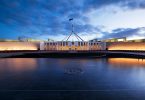Are Aussies politically disengaged?
The last ten years have seen a worrying trend of ‘democratic deficit’ emerge in Australian politics. Gregory Kramer, author of The Apathetic Country, suggests that at least twenty percent of Australians are politically uninterested.
According to the AEC, voters are also showing declining trust in politicians and political institutions. Citizen interest and traditional forms of political participation have been on a downturn with declining sign-ups to political parties, unions, meetings and rallies.
Where do Aussies receive their political information?
Aussies are increasingly using the internet as their preferred source of political information and news. With 22.32 million of us online nation-wide in January this year, the way that we are receiving information is changing dramatically.
Experts including Ariadne Vromen, author of Digital Citizenship and Political Engagement, suggest that social media may be a way to cut through this nation-wide political disengagement, particularly among young voters.
What would an ‘e-democracy’ look like?
Although some forms of traditional political engagement have been on the decline, evidence of ‘e-democracy’ has been on the rise.
With many political campaigns going digital, new forms of democratic participation have started to emerge. Voters are redefining what political discourse looks like online by liking, posting or creating political content.
The future of Australian politics
Not only is social media changing the way that politicians communicate with voters, but also the way that voters communicate with their elected officials.
The Australian Department of Finance and Deregulation writes that the emergence of e-democracy, or what they call ’Government 2.0’, provides an opportunity for a more “open and transparent form of government.”
If we play our cards right, social media could make politics accessible to anyone with an internet connection. Social media has the capacity to help us hold our elected officials accountable, share political information and engage in democratic discourse online.








[…] How will social media change politics and democracy in Australia? […]